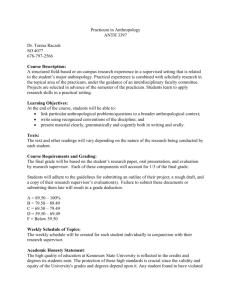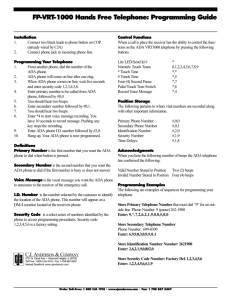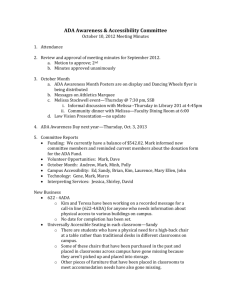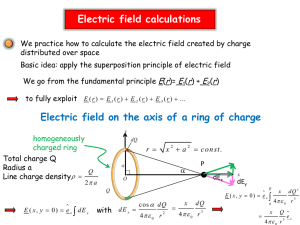ADA Public Relations Team Style and Grammar Guide
advertisement
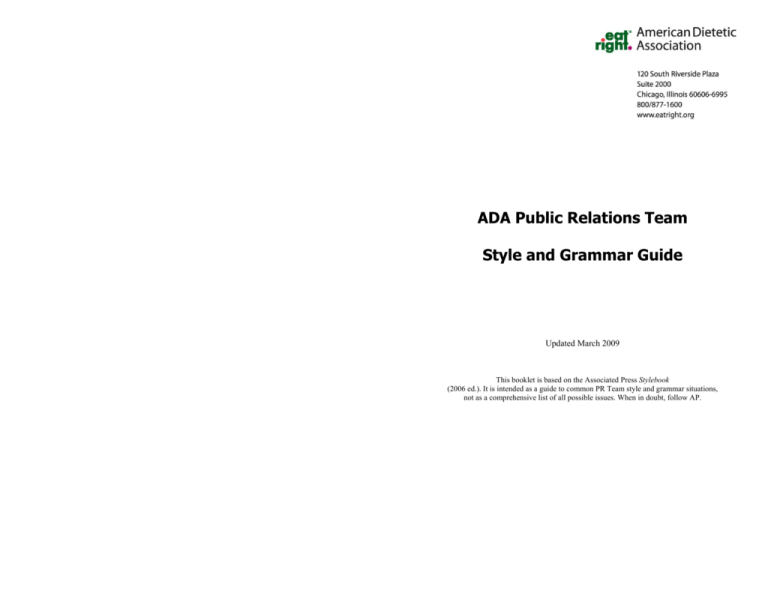
ADA Public Relations Team Style and Grammar Guide Updated March 2009 This booklet is based on the Associated Press Stylebook (2006 ed.). It is intended as a guide to common PR Team style and grammar situations, not as a comprehensive list of all possible issues. When in doubt, follow AP. 2 Abbreviations and Acronyms Keep the use of abbreviations and acronyms to a minimum to avoid “alphabet soup” that can confuse the reader. Do not use an abbreviation or acronym, especially an unfamiliar one, just to save a few words of text. Do not put a group’s abbreviation in parentheses immediately following the first mention of the group. The House of Delegates issued a report on dietetics education. Not: The House of Delegates (HOD) issued a report on dietetics education. On first reference, spell out an organization’s name and use its abbreviation on second reference. National Institutes of Health/NIH Food and Drug Administration/FDA U.S. Department of Agriculture/USDA Extremely common abbreviations that virtually everyone recognizes do not need to be spelled out, even on first reference. AIDS, CNN, FBI No periods between letters in an abbreviation or acronym. Academic Departments and Titles Do not capitalize academic departments unless they are proper nouns. French department (or department of French) But: dietetics department (or department of dietetics) 19 Time Element To help the reader understand what is happening when, keep the subject, verb and time element as close together as possible, especially if there is more than one action taking place in the sentence. Make it plain which noun the verb refers to. The city council ruled Tuesday the highway billboard must come down. The city council ruled the highway billboard must come down Tuesday. If needed to avoid implying the time is the subject of the verb, move the time element to before the verb. The police Tuesday caught five bank robbers. To avoid The police caught Tuesday. Under Way Two words. Registration for the workshop is now under way. Verbs Whenever possible, use verbs conveying action. Avoid the passive voice. We made mistakes. Not: Mistakes were made. They attended the concert. Not: The concert was attended by them. Web In Internet usage, it is always capitalized, as in Web page. This includes new words like Webinar. Web site is two words. Do not capitalize site. Capitalize a professional or academic title such as president, chair, speaker or professor only when it immediately precedes the person’s name. ADA President Jane Smith Associate Professor Mary Johnson Otherwise, lower-case all titles. Jane Smith is the president of the American Dietetic Association Mary Johnson is an associate professor of nutrition In the phrase World Wide Web, all words are capitalized. 18 Teams When referring to departments at ADA, capitalize Team and spell out all words, such as and (do not use &). Careers and Student Services Team Scientific Affairs and Research Team Telephone Numbers Put a slash between area code and prefix and a dash between prefix and suffix. Abbreviate “extension” as “ext.” and precede it with a comma. 800/877-1600, ext. 1234 Do not use a 1 before the area code. That Avoid overuse of “that” as a conjunction. “That” can usually be deleted with no loss of understanding and can save words as well. These are the books I need for the class. Instead of These are the books that I need for the class. Time Put periods and no spaces between letters in a.m. and p.m. and in lower case. Not am, pm, AM or PM. To avoid confusion, do not use 12 a.m. or 12 p.m. Use midnight and noon. Put a space between the numeral and the a.m. or p.m. 10 a.m. 11:15 p.m. At the top of the hour, do not use :00. 6 a.m. 8 p.m. Spell out time zones, enclose in parentheses, capitalize “Time.” The session will begin at 6 p.m. (Central Time). 3 To make it easier to read, use as few words of the person’s title before his or her name as possible. Avoid constructions like: Associate Professor of Nutrition and Chair of the Department of Dietetics at the University of Illinois Mary Johnson. Much of that information can go after the person’s name and be lowercased. Do not capitalize casual or temporary positions, such as the meeting’s chairman or the group’s leader. See also Credentials. ADA Abbreviation Spell out the entire name of the American Dietetic Association on any first reference. Includes headlines Abbreviate the name of the Association as “ADA.” Do not use the ADA The same rule applies for other ADA units such as House of Delegates. HOD, not the HOD ADA Members In keeping with the recommendations of the Strategy and Terminology Work Group that were adopted by the Board of Directors: The term “ADA members” should be used in both public and member communications when the focus is on multiple members of the Association or its entire membership. See also Dietetics Professional, Dietetic Technician, Registered and Registered Dietitian. ADA Times The publication’s name is always italicized. Do not abbreviate the name on second reference, such as The Times. 4 17 Address ADA’s official address: American Dietetic Association 120 South Riverside Plaza, Suite 2000 Chicago, IL 60606-6995 e-mail address (optional) www.eatright.org Sentence Spacing Sentences should have one space between the period and the first letter of the next sentence. Spell out South and Plaza in ADA’s mailing address. Spell a person’s or organization’s name however they do. All other addresses: Contact name Company name Suite or apartment number Street number, street name, abbreviation (St., Ave., Blvd.) City, state, postal code State Names If it stands alone in a sentence, use the state’s full name. Abbreviate Street (or Avenue, Road…) when used in an address, but spell it out and capitalize it when not referring to a specific address. The name of the street: Michigan Avenue. In an address: 900 N. Michigan Ave. See also State Names. Ampersand Use only as part of a proper title or name. Food & Nutrition Conference & Expo And/or Avoid using except in a direct quotation. Pick one that is appropriate for the sentence. Association When referring to ADA, always capitalize the word Association. All ADA members should be proud of their Association and its achievements. The Association is OK as second reference to ADA. This style does not apply to any other association. Spelling Use whichever spelling of a word is listed first in a commonly used dictionary. Use the two-letter Postal Service state abbreviations only in a formal mailing address. If the state name is to be abbreviated, unless it is part of a mailing address, use the following abbreviations, with periods, in all cases. Do not leave spaces between letters or periods: Ala. Fla. Mass. N.C. Pa. Wis. Ariz. Ga. Mich. N.D. R.I. W.Va. Ark. Ill. Minn. N.H. S.C. Wyo. Calif. Ind. Miss. N.J. S.D. Colo. Kan. Mo. N.M. Tenn. Conn. Ky. Mont. N.Y. Va. D.C. La. Neb. Okla. Vt. Del. Md. Nev. Ore. Wash. Exceptions: The following states names are never abbreviated except in formal mailing addresses: Alaska, Hawaii, Idaho, Iowa, Maine, Ohio, Texas, Utah In other words, do not abbreviate any state name with five or fewer letters, plus Alaska and Hawaii. If the state name (or D.C.) is used in the middle of a sentence, put commas on either side. Many people visit the zoo in San Diego, Calif., each year The average temperature in Washington, D.C., is about 65 degrees. 16 Registered Dietitian Dietitian is spelled with a “t.” Some dictionaries lists dietician as an accepted alternate, but ADA officially adopted dietitian in 1930 as its preferred spelling. Use the complete credential registered dietitian, not dietitian. Exceptions include a proper name or job title, such as clinical dietitian or Consultant Dietitians in Health Care Facilities dietetic practice group. On second reference, RD is acceptable. In keeping with the recommendations of the Strategy and Terminology Work Group that were adopted by the Board of Directors: The term registered dietitian should be used when spotlighting the RD in press materials and public communications relating to the food, nutrition and health of both individuals and entire populations. Marketing efforts should focus on the education and experience of an RD. This prominent focus on the RD will not necessarily exclude references to ADA members as appropriate to the communication vehicle or the message being conveyed. Science Terminology and Jargon Use language that is appropriate for the reading or listening audience. Especially for a general audience, keep use of scientific terms and jargon to a minimum. 5 Bulleted Lists No punctuation after items in a list, except put a period after the last bullet. Exception: Punctuate complete sentences appropriately. Calories Spell out the word in text. Do not use the scientific abbreviation kcal except in a quote. a 2,000-calorie diet Not: a 2,000-kcal diet Note: In nutrition science, energy often is synonymous with calories. Since that can be confusing to the average person – in part because concepts like “increased energy” are usually considered good things – use the word calories instead of energy whenever possible. See also Science Terminology and Jargon below. Capitalization In sentences, capitalize as few words as possible other than proper nouns (people, places, organizations). See also Credentials, Headlines and People and Persons. Commas As a general rule, use commas sparingly. Do not use a comma prior to the last item in a list. The colors of the flag are red, white and blue. AP lists some exceptions to this general rule. Avoid nutrition science terms like efficacy, etiology, paradigm or parenteral. Most people do not know what they mean. If you need to use a science term, explain or define any that an average nonscientist probably would not understand. Her lecture focused on the etiology, or the causes and origins, of the disease. Use a comma after a dependent clause (generally includes a preposition or prepositional phrase). Most of the time, people should eat more vegetables. In other words, nutrition is important. However, many people don’t know that. See AP for more detailed discussion of comma usage. Don’t go overboard with explanations. The fact that you don’t know what something means doesn’t mean no one does. This is a real-life example: The Louvre, a famous museum in France. 6 Company Names Do not put a comma before words like Inc. or Co. Tropicana Products Inc. Credentials In internal (member) publications such ADA Times or a list of candidates, give a person’s academic credentials together with his or her name on first reference. Elaine Anderson, MBA, RD, CDN, is ADA’s 2008-09 speaker-elect. In external (public) communications such as press releases, ADA’s and AP’s style is to not follow names with a list of initials but instead to convey the person’s credentials or expertise in words. The article quotes registered dietitian and ADA spokesperson Lona Sandon. Academic and professional credentials have no punctuation. PhD, MS, RD Not: Ph.D., M.S., R.D. List credentials in the following order: 1. Permanent academic degrees in decreasing order: MD, PhD, MS 2. Professional credentials that must be maintained a. National credentials: RD, RN b. State credentials: LD, LN 3. Organizational certifications or fellowships: FADA, FASP Don’t list bachelor’s or associate degrees unless they are relevant to the story. 15 Plural Do not use apostrophes when making an abbreviation or acronym into a plural. DPGs, RDs A corporation, association or other organization is a singular noun. Thanks to Quaker Oats Co. for its sponsorship of the session (not “their”). The plural of president-elect is presidents-elect, not president-elects. The same goes for chairs-elect and similar titles. See the dictionary for rules regarding plurals of specific words. Possessives For singular nouns not ending in s, add “s” (mom’s recipe). For singular nouns ending in s, add “s” only if the next word does not begin with an “s” (business’s goals; business’ strengths). For plural nouns not ending in s, add “s” (children’s nutrition). For plural nouns ending in “s,” add an apostrophe (teenagers’ fitness). Quotation Marks Font permitting, use “curly” quotation marks, not “straight.” A tip: In Word, use the search and replace function. Search for quotation mark, replace with quotation mark. Same for apostrophes. Remember to open and close all quotations. When using a person’s academic credentials in a sentence, the last credential must be followed by a comma, unless the credential comes at the end of the sentence. Jane Smith, MS, RD, LD, is the president-elect of the American Dietetic Association. If a quotation that ends a paragraph is a complete sentence, do not close the quote before starting a new paragraph. But: If a paragraph ends with a quotation that is not a complete sentence and the next paragraph will continue the quote, close the partial quote before starting a new paragraph and open the new paragraph with a quotation mark. 14 Use commas with numbers of four digits and up. 1,000-calorie diet 25,347 members Numbers at the beginning of a sentence are always spelled out. Two cups of sugar should be enough for the recipe. One thousand people attended the conference. 7 Dates Spell out complete names of days and months. Do not write the year if the reference is to the current year. Assuming this is written in 2008: The registration deadline is April 26. The book will be published in April. Nutrition/Nutritional Nutrition can be a noun or an adjective. Use commas both before and after the year in a sentence. The application deadline of July 1, 2009, has been extended. Tuesday, October 8, 2002, was a day she would never forget. Used as an adjective, nutrition means “relating to science or professional practices of nutrition.” Nutrition analysis, assessment, awareness, care, knowledge, management, needs, practices, principles. Exception to the previous rule: Do not use commas when writing only the month and year. The July 2001 Journal of the American Dietetic Association contained an article on predictors of self-initiated dietary change. Nutritional means “conveying nutrients” or “nutrient-related.” Nutritional adequacy, benefits, consequences, factors, impact, progress, quality, risk, value. Numerals stand alone in dates. June 23, not June 23rd September 1, not September 1st Online One word. Use words instead of punctuation marks in sentences. She served on ADA’s Board of Directors from 1987 to 1989. Not: She served from 1987-89. People and Persons The plural of person is people. Do not use persons except in a quotation, title or formal name. For example: ADA has a position statement on Nutrition intervention in the care of persons with human immunodeficiency virus infection. The plural of the registered dietitians who speak to the media on behalf of ADA is spokespeople, not spokespersons. Do not use chairperson unless it is the office’s formal title. Percent Spell out the word in text. Dietetics Professional In general, do not use. ADA’s style is to use registered dietitian, dietetic technician, registered and ADA member as appropriate, to describe people who hold these credentials and work in the dietetics field. In keeping with the recommendations of the Strategy and Terminology Work Group that were adopted by the Board of Directors: The term dietetics professionals should be limited in all ADA communications, internal and external, because it adds to marketplace confusion and undermines the value of CDR credentials. The term dietetics professionals should be used only as secondreference descriptor. OK to use % in a chart or graph. See also ADA Members, Dietetic Technician, Registered and Registered Dietitian. 8 Dietetic Technician, Registered Use the complete credential, not just dietetic technician, except if it appears in a quote, job title, organization’s name or other proper name. 13 Journal of the American Dietetic Association Always italicized. Spell out the entire name on first reference. The credential takes a comma after technician but not after registered. Dietetic technicians, registered make up 4 percent of ADA’s membership. Journal is OK as an abbreviation or second reference. Use J Am Diet Assoc in a formal citation like a footnote. On second reference, DTR is acceptable. Do not use JADA. In keeping with the recommendations of the Strategy and Terminology Work Group that were adopted by the Board of Directors: The term dietetic technician, registered should be used when spotlighting the DTR in internal and external communications. The Dietetics Education Task Force Report and Recommendations released in February 2005 noted that by definition, “technician” refers to a person who has been trained at the technical level requiring less than a baccalaureate degree. An RD with the minimum of a baccalaureate degree is considered the professional. The DTR should be highlighted as technical support personnel. This is consistent with definitions of a technician and professional in other disciplines. That the DTR works under the supervision of the RD was approved by the Board of Directors in 2003 and was reaffirmed through acceptance of the ADA Scope of Dietetics Practice Framework. Doctor Refer to someone as doctor or Dr. only if 1) the person is a medical doctor (includes dentist, veterinarian and osteopath) and 2) it is relevant to the story. Do not call people with PhD, EdD, DrPH or other degrees doctor. Junior/Jr. No comma before Jr. following a person’s name. The same goes for Roman numerals, such as John Jones III. Lifelong One word, as in lifelong learning. Months Spell out full names of months in text. Mr., Mrs., Miss, Ms. Do not use unless it is relevant to the story or the reference would otherwise be unclear. Mrs. Roberts died in 1993 and Mr. Roberts made a $100,000 gift to the ADA Foundation the next year in his wife’s memory. Numbers and Numerals Express whole numbers zero through nine in words. Use numerals for 10 and over. Exceptions: Always use numerals for the following: Ages Percentages Lists of daily values or nutrition information, like recipes (4 cups) 12 Unless the word would be unclear or hard to read (see above), do not use a hyphen with a prefix if the next word starts with a consonant. predetermined, postpartum When deciding whether to hyphenate a new or unfamiliar word containing a prefix, think of more common words that use the prefix and spell it the same way. Spell teleseminar as one word, as in television. Not: tele-seminar Compound modifiers using the word well always take a hyphen. The American Dietetic Association serves the public by promoting optimal health and well-being. Note: Well-being is always spelled with a hyphen whether it is used as a modifier or a noun. When alphabetizing a list that includes hyphenated last names, list the person under the letter of the first hyphenated name. Janet White-Green is listed under “W.” Michelle Brown Silver is listed under “S.” Internet The word is always capitalized. Italics Italicize proper titles of books, newspapers, journals, magazines, movies, software, films, television programs, songs, speeches and works of art. 9 Elected Officials ADA’s style for elected officials’ titles varies slightly from AP: 1. Abbreviate United States Representative in a title as U.S. Rep. 2. Abbreviate United States Senator as U.S. Sen. 3. Use the person’s name, followed in parentheses by one letter representing the official’s political party, followed by a period. Use a dash – with no spaces before or after the dash – followed by the person’s state, using the abbreviations under State Names below. 4. Then close the parentheses. Example: The sponsor of the bill, U.S. Sen. Dick Durbin (D.-Ill.), said the legislation would give millions of people access to health insurance. E-mail The word always uses a hyphen. Etc. Avoid using. Ethnic Groups Do not capitalize terms like black or white when writing about ethnicity except in a formal title such as a book or an organization’s name. AP prefers black to African-American. Use African-American only in quotes or if that is how a person or group describes themselves. African-American is always hyphenated. Articles and chapters appearing in books and periodicals are placed in quotation marks. AP prefers Hispanic to Latino, but says Latino “is acceptable for Hispanics who prefer that term.” When a phrase that should be in italics appears in text that is already italicized, remove the italics from the phrase. She asked when the next issue of ADA Times would be published. When possible and appropriate, use a more specific identification, such as Cuban, Mexican-American or Puerto Rican. See also Quotation Marks. Other than African-American, the names of ethnic groups or locations used as nouns are not hyphenated if the sentence refers to a geographic location or people who come from that place. Latin America, Latin American because there is such a place as Latin America. But: Japanese-American because there is no such place as Japanese America 10 11 When used as an adjective, hyphenate all groups’ names. Five Asian-American organizations participated in the parade. Health Care/Health-care/Healthcare When used as a noun, health care is two words. Spell and punctuate proper names (such as organizations) however they do. When used as an adjective, health-care takes a hyphen. Food & Nutrition Conference & Expo Use ampersands (&), not the word and. Do not use healthcare as one word, except in a proper name. Spell out Food & Nutrition Conference & Expo on first reference. He/She Do not use slashes, such as he/she, him/her, his/hers. Write it out: “he or she.” The abbreviation FNCE is acceptable on second reference in ADA member communications but it should be avoided in writing for the public, since most people do not know what FNCE means. Try to avoid using he or she very often and especially avoid using it more than once in a sentence. Expo is not short for anything, such as Exposition. Do not use s/he. Foodservice One word. Hyphens Avoid when possible, especially with nouns. Most compound nouns should be expressed either as one word or two. Check a dictionary or AP. Examples: fund raiser, decision maker. Headlines Should be written in title case, capitalizing the first letters of all words in the headline, except: Articles (a, an, the...) Coordinating conjunctions (and, but, or, nor, for, so…) when used as conjunctions. In the headline Kid to Joe Jackson: Say It Ain’t So,”So” would be capitalized since it is not used as a conjunction. Prepositions except if they are part of a verb. Do Performance Foods Measure Up? ADA Moves Forward Capitalize articles, conjunctions and prepositions if they are part of a proper name or if they are the first word of the headline. Two nouns or two adjectives used as an adjective (an adjectival phrase) should be hyphenated. the blue-green sea the once-crowded exhibit hall Modifying phrases that begin with adverbs (an adverbial phrase) do not take hyphens. an especially tall building scientifically correct morbidly obese Use a hyphen with a prefix only when: Not using a hyphen would make the word unclear or hard to read. re-evaluate, co-president The prefix ends in a vowel and the next word starts with a vowel. multi-ethnic, pre-emptive Not using a hyphen would change the meaning of the word. recover/re-cover, resign/re-sign The next word is capitalized. pre-Renaissance art Joining doubled prefixes. sub-subparagraph



